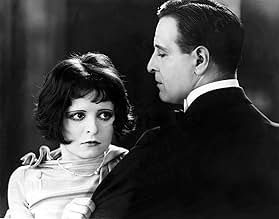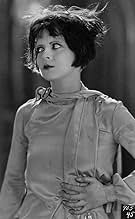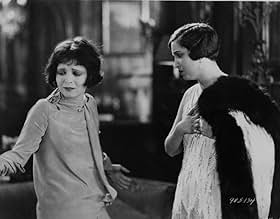A young girl becomes a "flapper", defying her parents and the community.A young girl becomes a "flapper", defying her parents and the community.A young girl becomes a "flapper", defying her parents and the community.
- Director
- Writers
- Stars
- Awards
- 2 wins total
- Director
- Writers
- All cast & crew
- Production, box office & more at IMDbPro
Featured reviews
I fell in love with this play when I read it in the Burns Mantle Best Play series - it was certainly the best of its year and perhaps of the decade in both its characterizations and structure and in the morality tale that was dead on for its time. This was the sort of thing that would have been remade as an early talkie if the stock market crash hadn't changed that flapper world forever.
The plot is laid out here in other reviews. Alice Joyce's leading performance and Clara Bow's supporting one are both of award calibre as is the screenplay adaptation. It is competently directed and photographed, nothing special in the technical categories. What stands out is the writing and the acting of the women. Startling and special. Very worth seeking out.
The plot is laid out here in other reviews. Alice Joyce's leading performance and Clara Bow's supporting one are both of award calibre as is the screenplay adaptation. It is competently directed and photographed, nothing special in the technical categories. What stands out is the writing and the acting of the women. Startling and special. Very worth seeking out.
Dancing Mothers is definitely a product of its time. It is the era of the flapper, when morality flew out the window and people were up for having a good time. Alice Joyce plays Ethel Westcourt, a lonely wife and mother whose family abandons her for the fun of nightclubs. Her daughter Kittens (Clara Bow) is particularly wild and pays far too much attention to playboy Jerry Naughton (Conway Tearle). Ethel decides she's tired of waiting around the house; she takes matters into her own hands and goes to the club her daughter frequents. There, she gets close to Jerry, in an attempt to lure him away from her daughter, but her plan backfires when he falls for her but her daughter just won't let go.
Famous today simply for the presence of effervescent Bow, this movie is an entertaining look into the Roaring Twenties era that she symbolizes. Bow takes up quite a lot of this film, which is exciting, since most of her early appearances are scant at best. Joyce makes a good impression as well; she is beautiful and a competent actress.
The music score provided by Grapevine Video isn't bad at all and suits the film nicely.
Famous today simply for the presence of effervescent Bow, this movie is an entertaining look into the Roaring Twenties era that she symbolizes. Bow takes up quite a lot of this film, which is exciting, since most of her early appearances are scant at best. Joyce makes a good impression as well; she is beautiful and a competent actress.
The music score provided by Grapevine Video isn't bad at all and suits the film nicely.
Dancing Mothers is unique in two ways...its ending and showing how women have minds and opinions of their own. While most Hollywood Melodramas of this period had happy, "Pollyanna-ish" endings...Dancing Mothers strays in a most realistic and refreshing way. The Mother (Alice Joyce), tired of being taken for granted, goes out on her own and leaves her selfish daughter (Clara Bow) and husband (Norman Trevor) behind. an ending that todays audiences do not have a hard time swallowing, but audiences of the 1920's expected everything to be tied up in pretty Hollywood ribbons and all made good. And bravo for those who chose to have a woman hold her own and stand up for herself and not give in to what societal norms would dictate. Strong women were not too very typical in the silent era.
Former stage star Alice Joyce (as Ethel "Buddy" Westcourt) stays at home while her husband and daughter enjoy a life of cruising, boozing, and romantic entanglements. When she finally decides to go out on the town, Ms. Joyce meets playboy Conway Tearle (as Gerald "Jerry" Naughton), who has been seen with Joyce's frequently tipsy daughter Clara Bow (as Catherine "Kittens" Westcourt). To protect Ms. Bow's tenuous honor, Joyce makes a date with Mr. Tearle. Her loneliness is over when Joyce unexpectedly falls in love with Tearle. He returns her love, and proposes. But, husband Norman Trevor (as Hugh "Hughie" Westcourt) has called it quits with his latest mistress, and wants his wife back...
What should Joyce do?
Her character's decision puts "Dancing Mothers" ahead of its time. This was a great role for Joyce, who became one of film's first huge movie actresses in 1912 (and, she was wildly popular throughout the decade). Her restrained style was often heralded by critics, and Joyce might have been considered for a "Best Actress" Oscar, had they started a couple of years earlier. Joyce's confrontation with Bow, and her final scene, are most memorable. It helped that Joyce was directed by Herbert Brenon, a favorite director who used her well. This was a top "Paramount" production, with veterans Dorothy Cumming and Eleanor Lawson, plus young Donald Keith rounding out what could then be called an "All-Star" cast.
******** Dancing Mothers (3/1/26) Herbert Brenon ~ Alice Joyce, Conway Tearle, Clara Bow, Donald Keith
What should Joyce do?
Her character's decision puts "Dancing Mothers" ahead of its time. This was a great role for Joyce, who became one of film's first huge movie actresses in 1912 (and, she was wildly popular throughout the decade). Her restrained style was often heralded by critics, and Joyce might have been considered for a "Best Actress" Oscar, had they started a couple of years earlier. Joyce's confrontation with Bow, and her final scene, are most memorable. It helped that Joyce was directed by Herbert Brenon, a favorite director who used her well. This was a top "Paramount" production, with veterans Dorothy Cumming and Eleanor Lawson, plus young Donald Keith rounding out what could then be called an "All-Star" cast.
******** Dancing Mothers (3/1/26) Herbert Brenon ~ Alice Joyce, Conway Tearle, Clara Bow, Donald Keith
This little melodrama concerns a mother and her daughter falling for the same man. Mum's been the good little "stay-at-home" while her daughter and husband do the town. But Mum gets her revenge! Alice Joyce is very good as mum, and the ending is quite politically subversive - but it is the wonderful Clara Bow who steals the picture. Her vitality, as a little flapper, is mind-blowing, her beauty unsurpassed, and her gowns magnificent. Worth seeing just for the scene on the couch when Clara lies back laughing amongst the cushions - it'll make your heart race.
Did you know
- TriviaPrints of this film--at 65 minutes--are held by the Library of Congress and the UCLA Film and Television Archives.
- Quotes
Mrs. Mazzarene: I warn you--you're playing with fire.
Ethel Westcourt: I'm playing with life!
- ConnectionsFeatured in Hollywood (1980)
Details
- Runtime
- 1h 6m(66 min)
- Sound mix
- Aspect ratio
- 1.33 : 1
Contribute to this page
Suggest an edit or add missing content





























